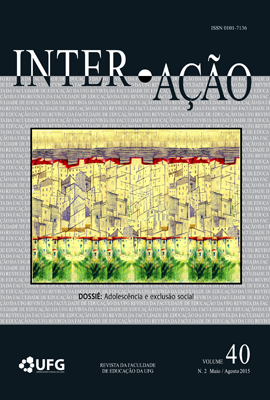AS TECNOLOGIAS DIGITAIS NA FRONTEIRA DO CONHECIMENTO: A INTERRELAÇÃO EDUCAÇÃO-CULTURA NO ENSINO SUPERIOR
DOI :
https://doi.org/10.5216/ia.v40i2.28762Mots-clés :
Tecnologias, Formação docente, Conhecimento, Ensino superiorRésumé
Um breve olhar sobre as publicações que trataram dos novos rumos da educação na última década revela que não é nova a discussão centrada nas tecnologias e seu significado na educação. A multiplicidade de produções a que se tem acesso pela Internet deixa visíveis seus traços e seus efeitos na educação e na cultura. Nesse contexto, questionar o papel das tecnologias digitais e sua contribuição na formação dos profissionais pode ser um modo de repensar o processo cultural e educativo com a utilização das tecnologias. Tomando como base resultados de pesquisa realizada com professores do ensino superior sobre a utilização das tecnologias digitais e sua implicação na formação do futuro profissional, o trabalho propõe reflexões sobre o uso da Internet como um espaço de especificidades e dessemelhanças entre as múltiplas culturas e o significado dessas mudanças para a formação de qualidade.
Téléchargements
Téléchargements
Publié-e
Comment citer
Numéro
Rubrique
Licence
A Inter-Ação utiliza como base para transferência de direitos a licença Creative Commons Attribution 4.0 para periódicos de acesso aberto (Open Archives Iniciative - OAI). Por acesso aberto entende-se a disponibilização gratuita na Internet, para que os usuários possam ler, baixar, copiar, distribuir, imprimir, pesquisar ou referenciar o texto integral dos documentos, processá-los para indexação, utilizá-los como dados de entrada de programas para softwares, ou usá-los para qualquer outro propósito legal, sem barreira financeira, legal ou técnica.
Autores que publicam neste periódico concordam com os seguintes termos:
1) Autores mantém os direitos autorais e concedem à revista o direito de primeira publicação, com o trabalho simultaneamente licenciado sob a Licença Creative Commons Attribution que permite o compartilhamento do trabalho com reconhecimento da autoria e publicação inicial nesta revista.
2) Autores têm autorização para assumir contratos adicionais separadamente, para distribuição não-exclusiva da versão do trabalho publicada nesta revista (ex.: publicar em repositório institucional ou como capítulo de livro), com reconhecimento de autoria e publicação inicial nesta revista.
3) Autores têm permissão e são estimulados a publicar e distribuir seu trabalho online (ex.: em repositórios institucionais ou na sua página pessoal) a qualquer ponto antes ou durante o processo editorial, já que isso pode gerar alterações produtivas, bem como aumentar o impacto e a citação do trabalho publicado.















